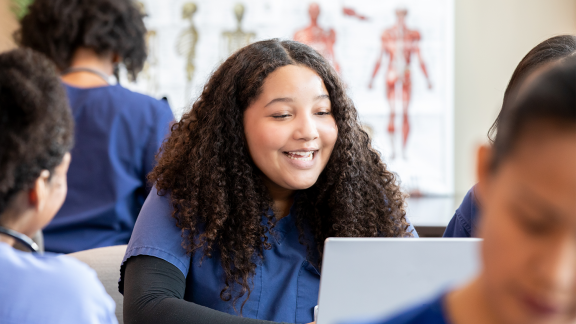Virtual learning for students

Overview
In May 2021, a small pilot of 20 students participated in a one and a half day virtual work-related learning event delivered via Microsoft Teams to enhance placement experience.
Key benefits and outcomes
-
Gave students the option for virtual training
-
Enabled cross working across different areas of Devon
-
Gave platform to multi-disciplinary team working across students of different years.
What the organisation faced
Planned placements from a university take place every year, but this year was the first-time additional learning was held virtually. This was a result of the trust wanting to offer students good access to learning even when working from home, which supported the ways of working during the COVID-19 pandemic.
What the organisation did
The practice education team saw an opportunity to bring in experienced clinicians to share their case studies and encourage multi-disciplinary team working for students to share their thoughts and clinical reasoning. As members of the practice education team and the occupational therapy lead delivered it as part of their current roles, additional funding was not needed to support the learning events.
Students were given a brief overview of assessment, care planning, intervention and discharge; these topics were chosen as they are components of practice across multiple professions; nursing, occupational therapy, social work and psychology.
A real-life case study presented by a professional clinician was used to give students the opportunity to understand and appraise research, apply relevant theory and research findings and identify areas for further investigation. Following a presentation of the case study, students were then split into small groups. Crucially the groups were of mixed ability in years one, two and three of nursing and occupational therapy. The year three students would lead the activity which was to work together to develop a 20-minute presentation for the next morning.
Each group delivered their presentation, had the opportunity for a short Q&A and was given feedback.
What was achieved?
Students got the chance to work collaboratively with other health and social professionals by experiencing and contributing to a simulated multi-disciplinary team meeting helped to develop soft skills such as speaking, listening, negotiation, planning and time management skills.
Year three students were able to demonstrate team leading skills and produce evidence towards:
-
confidently assessing needs and planning person-centred care
-
confidently managing the procedures in assessing, providing and evaluating care
-
confidently leading and managing person centred care and working in multi-disciplinary teams
-
confidently contribute to improving safety and quality of person-centred care
-
confidently coordinating person-centred care.
The expectations for all professions and levels of students began with the same core skills which were able to be signed off by the practice educators facilitating the session. These core skills included:
Leading others – more experienced students were able to show their delegating and facilitation skills by leading the small groups.
Communication – all students were encouraged to showcase their communication skills, including when actively listening to the presentation elements.
Clinical skills – students were able to demonstrate these in the presentations they developed and presented on the morning of the second session.
Time management and autonomous working – the groups of students were given a clear timeframe for the work to be completed and were able to use their individual time management skills to use this time how they felt most helpful.
Multi-disciplinary and mixed skill working – groups were put together with this in mind and the students were expected to work with those in different professions and at various stages of their study. They were encouraged to use the variety of experience to the best of their abilities.
Results and benefits
One of the main advantages delivering remotely via Microsoft Teams across a wide geographic area such as Devon is that travel time, costs and suitable room availability didn’t need to be a barrier. This complied with the trust’s guidance on COVID-19 and was more convenient for students and those delivering sessions.
Based on evaluation and feedback after the event, 100 per cent of students felt they had achieved a positive learning experience on top of their placement.
“It was amazing to see the totally different approach of each group to the presentations and the considerations they made with regard to supporting the patient. Having access to the thoughts of others is hugely beneficial to our learning, so thank you for giving us this opportunity”
“I liked how everyone approached the case study slightly differently. I was also surprised at how I was able to transfer previous knowledge from different workplaces and education to this case study without having any experience of working in adult mental health”
Future plans and T Level development
The team plans to scale up this kind of virtual learning offer and deliver this activity several times a year, with different services delivering a case study based on the particular needs of the students they are working with. This would provide the students with an insight into areas they may not be familiar with or would normally have the opportunity to learn about, such as CAMHS, specialist and forensic.
There are clear benefits to learning from peers in a collaborative way. The trust is keen to include this opportunity to a wider cohort of students and apprentices such as HCAs, CAPS apprentices, social work students, psychology interns and T Level students. This would truly simulate the multi-disciplinary approach to supporting our service users that happens within the trust.
Linking with the local further education college and in partnership with the Royal Devon and Exeter NHS Trust, the trust will offer several industry placements in 2022/23 to students who have enrolled on the T Level in health who were keen to undertake the specialist pathway ‘Supporting the Mental Health Team’.
These industry placements will also include virtual aspects of learning with the practice education team delivering virtual sessions for the months prior, on topics such mental health awareness, challenging behaviour and professional boundaries. The trust also has plans to deliver T Level placements for those students in the admin field in the future.
Takeaway tips for virtual learning events
-
Bring together as broad a range of students and professions as practical to enhance the students’ experience – make use of peer support!
-
Ensure some active collaborative learning takes place. This can be done using case study work
-
Set some basic ground rules with students, such as use of cameras to help with engagement
Contact information
For more information on using virtual placements, please contact Jo Horne, dpt.practiceeducation@nhs.net
Expanding placement capacity
One of the ambitions of the recently published NHS Long Term Plan is to develop sustainable growth in the NHS workforce and scale up the number of people in learning.
If employers are to meet this goal, then placement capacity will need to increase, while maintaining the required quality and level of educational support.
This article explores ideas and approaches for expanding placement capacity for students and learners.



